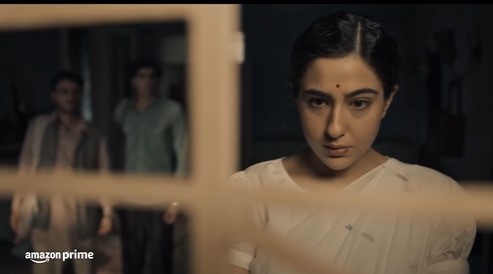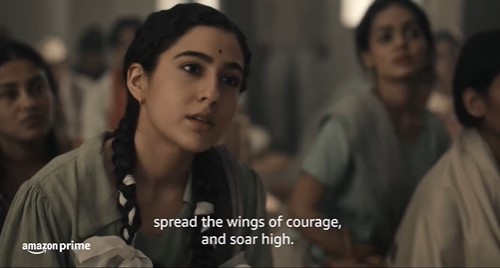“Ae Watan Mere Watan,” directed by Kannan Iyer and produced by Karan Johar, made its debut on Amazon Prime Video on March 21. Inspired by the success of the song from the Bollywood spy thriller “Raazi,” this Dharmatic Entertainment production delves into a crucial chapter of India’s fight for independence.
Set against the backdrop of the 1942 Quit India Movement, Sara Ali Khan leads the narrative as Usha Mehta, a young girl who ignites the spirit of rebellion through an underground radio station. Alongside Khan, the film features Sachin Khedekar, Abhay Verma, Anand Tiwari, and Emraan Hashmi.
Directed by Kannan Iyer and written by Iyer and Darab Farooqui, “Ae Watan Mere Watan” portrays a gripping tale of courage and defiance. The story follows Usha Mehta’s journey as she defies societal norms and familial expectations to broadcast messages of unity and resistance against British rule.
The film encapsulates the fervor of the Quit India Movement, with Mahatma Gandhi’s call for ‘do or die’ echoing throughout the narrative. As Usha Mehta and her comrades navigate the treacherous landscape of British oppression, they utilize the radio as a powerful tool of defiance.
Ae Watan Mere Watan Fails to enthuse

Despite its compelling premise, “Ae Watan Mere Watan” struggles to break free from clichés and predictability. From its formulaic dialogue to its stereotypical characterizations, the film falls short of delivering a truly immersive experience. Even moments of tension between the rebels and British authorities feel overshadowed by lackluster execution.
Sara Ali Khan delivers a lack lustered performance as Usha Mehta, embodying the spirit of her character with grace and determination. In a statement, Khan expressed her gratitude for portraying such a powerful role, emphasizing the importance of honoring the sacrifices made by unsung heroes.
But there’s nothing about this period drama which breaks out of familiar moulds. Right from an opening scene when little Usha looks up at a row of Siberian cranes, giving her father a chance to dole out a sonorous lecture about, yes, finding her wings, you despair: the dialogue, overall writing, treatment, plotting, is a banal blur. O’Neill strides about, playing the officer-barking-orders to the hilt, drowning the sole interesting segment, in which the authorities and the youthful radio operators play a cat-and-mouse game. And we never get past the feeling that the whole thing is a giant set.
Overall, “Ae Watan Mere Watan” offers a glimpse into a pivotal moment in India’s history, albeit with a familiar narrative structure and conventional storytelling. While Khan’s portrayal adds depth to the film, it ultimately falls short of leaving a lasting impact.

